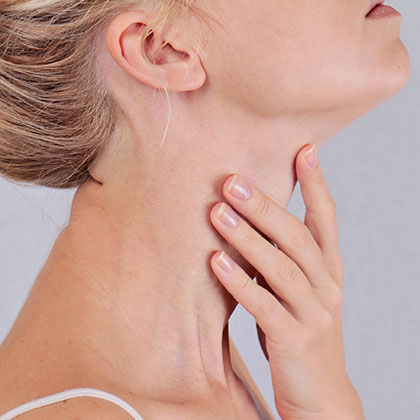Years ago iodine was commonly used in liquid form as a skin antiseptic, thanks to the fact that it kills bacteria and other harmful microorganisms. It’s still often used today to disinfect skin before and after surgery.
But iodine is also an important mineral that should be part of a healthy balanced diet, as it’s essential for the normal working of the thyroid gland. Without it, your thyroid gland cannot make thyroid hormones such as thyroxine. And without thyroid hormones many of your body’s processes will be affected, as these hormones regulate the metabolism of every cell in your body. See our guide to thyroid disorders for more information.
In the 1800s and the early part of the 20th century, iodine deficiency was common in the UK. Then in the 1930s, farmers began adding iodine to cattle feed to improve the health of their livestock. This also improved iodine intake in the human population, thanks to the fact that milk became richer in iodine. Post-war campaigns to encourage people to drink more milk – including the provision of free milk for school children – also helped, and as a result iodine intake in the UK increased by three fold.
For many of the following years it was thought that the UK population was getting sufficient iodine. However, more recently research by experts from the Royal Free Hampstead NHS Trust, the British Thyroid Association and the British Thyroid Foundation has suggested many schoolgirls in this country – almost 70 percent – have a mild iodine deficiency, while 18 percent have very low iodine levels (i).
A study published in the journal Nutrients also shows pregnant women in various locations around the UK are also deficient in iodine (ii).
How much do you need?
According to European Food Safety Authority recommendations, the adequate amount of iodine required per day is as follows (iii):
-
Adults - 150µg
-
Pregnant women - 200µg
-
Breastfeeding women - 200µg
The World Health Organization recommends 250µg a day for pregnant and breastfeeding women, as well as 90µg per day for children (iv) (though the EFSA suggests an adequate intake of between 70 - 130 µg for children over the age of seven months (iii) ). Too much iodine can also lead to thyroid problems – the safe upper limit is around 600µg a day for adults and pregnant women (v).
Not getting enough iodine in your diet in the long term can cause problems with your production of thyroid hormones. This can be a particular problem if you’re pregnant, as it may affect the development of your baby’s brain (see Iodine and pregnancy, below).
There are signs that you may be deficient in iodine, including the following:
-
Constant fatigue
-
Unexplained or unusual weight gain
-
Weak muscles
-
Feeling cold (even when it’s warm)
-
Concentration difficulties
-
Poor memory
-
Low mood
-
Constipation
-
Facial puffiness
-
Hair loss
-
Dry skin
-
Weak or slow heart beat
If you feel constantly tired and fatigued, this could be a sign of iodine deficiency. Iodine deficiency can also cause enlargement of the thyroid gland, as the gland becomes larger in order to trap more iodine. This swelling is called a goitre, and can be a visible lump in your neck. However, visible goitre caused by low iodine intake isn’t seen very often in the UK (vi).
Which foods contain iodine?
According to the British Thyroid Foundation, the richest dietary sources of iodine are fish, milk, other dairy products and eggs (vii). For most people, milk is one of the main sources. However, research in the UK suggests organic milk is 41-44 percent lower in iodine than non-organic varieties (viii) (ix). Winter milk is also higher in iodine than summer milk (ix), thanks to the fortified feed eaten by cows while they’re indoors when it’s cold outside. As for fish, white varieties are higher in iodine than the oily varieties (x).
Iodine is also found in concentrated amounts in seaweed. However seaweed can provide too much iodine, which is why experts recommend eating seaweed no more than once a week, especially if you’re pregnant (xi). Different types of seaweed have higher concentrations of iodine – brown seaweed such as brown kelp is much higher in iodine than green seaweed such as the nori seaweed used to make sushi (xii).
This is good news for sushi fans – according to the British Thyroid Foundation, a 190g portion of sushi contains anything from 17 - 38µg of iodine, which is well within the daily requirements (vii).
Plant foods such as cereals and grains also contain iodine. However, the amount found in these foods depends greatly on the level of iodine in the soil where they’re grown. This can make it difficult to estimate the level of iodine in plant foods. It can be difficult to estimate how much iodine is found in other foods too, since other things can affect iodine levels – for example, with milk it can vary with the time of year.
The British Dietetic Association has put together the following list of foods and how much iodine they contain (though the amounts are for guidance only) (vi):
-
Non-organic cow’s milk - 50 -100µg per 200ml
-
Organic cow’s milk - 30 - 60µg per 200ml
-
Yoghurt - 50 - 100µg per 150g
-
Cheese - 15µg per 40g
-
Haddock - 390µg per 120g
-
Cod - 230µg per 120g
-
Plaice - 30µg per 130g
-
Salmon fillet - 14µg per 100g
-
Canned tuna - 12µg per 100g
-
Prawns - 6µg per 60g
-
Scampi - 160µg per 170g
-
Eggs - 25µg per 50g egg
-
Meat/poultry - 10µg per 100g
-
Nuts - 5µg per 25g
-
Bread - 5µg per 36g slice
-
Fruit and vegetables - 3µg per 80g slice
You can also buy salt with added iodine in certain food stores – though it’s not that widely available here. Many other countries have tackled iodine deficiencies in their populations by adopting iodine fortification programmes, where the mineral is routinely added to table salt.
However, such a programme has never been introduced here in the UK, despite many experts calling for it. There again with the government recommending that you eat less salt for health reasons, relying on iodised table salt may not be the best way to increase your iodine intake.
Iodine and pregnancy
Pregnant women need more iodine than other adults because they transfer iodine and thyroid hormones to their developing baby during pregnancy. Iodine is particularly important for the development of a baby’s brain, not just while they’re developing in the womb but also during early life, when they get iodine through breast milk.
Indeed, one study, published in The Lancet (xiii), has found that mild iodine deficiency during pregnancy may affect children’s intelligence. The study, which involved 1,000 families, claims primary school pupils whose mothers had too little iodine while pregnant had lower IQs and reading scores than those whose mothers had sufficient iodine during pregnancy.
Experts recommend women who are planning to become pregnant to make sure their diets include an adequate supply of iodine for several months beforehand (vi). According to the British Dietetic Association, this is because you can build up good stores of iodine in your thyroid before you become pregnant, which helps your thyroid to work well during pregnancy (vi).
The British Thyroid Foundation also suggests women who have no history of a thyroid disorder should make sure they get adequate iodine for the three months prior to pregnancy as well as while they are pregnant (vii).
However, those who have been diagnosed as having an underactive thyroid don’t need any additional iodine. But they should see their GP to make sure the amount of thyroxine replacement (levothyroxine) they’re taking is adequate, both before conception and during their pregnancy – especially during the first three months – as they may need a higher dosage.
While you’re pregnant – and indeed during the few months before conception and afterwards during breastfeeding – it’s advisable to make sure you’re getting enough iodine in your diet. That’s because pregnant women need more of this mineral, as it’s important for the development of their baby’s brain. According to the UK Iodine Group, studies show pregnant women in various locations around the UK are classed as mildly to moderately iodine deficient.
The main sources of iodine in the UK diet are milk, other dairy products and fish. According to the NHS, women who are pregnant should try to eat two portions of fish a week, one of which should be oily fish such as salmon, sardines or mackerel. However, there are some types of fish you should avoid while pregnant or planning to get pregnant, namely shark, swordfish and marlin.
The NHS also recommends eating two to three portions of dairy foods a day during pregnancy. However, bear in mind that organic milk has been found to have a lower amount of iodine than non-organic milk.
It can, however, be difficult to get enough iodine during pregnancy, as the recommended daily requirement is higher than that for other adults (the World Health Organization recommends 250µg iodine a day for pregnant and breastfeeding women, while the European Food Safety Authority recommends 200µg – whereas adults who aren’t pregnant need 150µg iodine daily).
Taking a daily multivitamin and mineral pregnancy supplement that contains iodine may be useful. Look for a supplement that contains iodine in the form of potassium iodide or potassium iodate, and check that it supplies around 140 - 150µg of iodine per daily intake.
Can a supplement help?
If your diet doesn’t contain much iodine, you may find it useful to take a supplement – a multivitamin and mineral or a multi mineral complex, for example – that contains iodine in the form of potassium iodide or potassium iodate. However, make sure any supplement you take does not contain more than the recommended daily adult amount of 150µg.
If you have an existing thyroid condition, however, taking a supplement that contains iodine isn’t recommended (xiv).
Dr Mark Vanderpump, consultant endocrinologist at the Royal Free Hospital in London and president of the British Thyroid Association has issued the following advice on taking iodine supplements (xv):
‘For people with a properly functioning thyroid iodine is essential, as it is required for the production of thyroxine. It is particularly important in women who are pregnant as it is needed to ensure the development of a baby’s brain during pregnancy and early life.
“People who are taking replacement thyroxine (levothyroxine) however do not have a functioning thyroid to absorb iodine, and therefore iodine is not required. For patients being treated for hyperthyroidism [over-active thyroid], taking an iodine supplement is unnecessary and can worsen the condition.”
The UK Iodine Group also says if you have a thyroid disorder, high-dose iodine preparations such as kelp are best avoided (vii).
Meanwhile, according to the British Dietetic Association, pregnant women may struggle to meet the higher recommendations for iodine during pregnancy and breastfeeding solely through diet, especially if they don’t eat rich sources of iodine (vi). However, many, but not all, multivitamin and mineral pregnancy supplements contain iodine, the association adds.
Again, if you’re pregnant you should make sure any supplement you take contains around 140 - 150µg of iodine, then aim to meet the rest of the requirement for pregnancy through your diet (vi).
Discovering the many benefits of iodine can help to support your overall health in the long run. For even more advice on how to keep your body healthy, our health library is a good place to start.
References:
-
Snart CJP. et al., Maternal Iodine Status and Associations with Birth Outcomes in Three Major Cities in the United Kingdom. Nutrients. 2019 Feb 20;11(2). Available online: https://www.ncbi.nlm.nih.gov/pubmed/30791590
-
Available online: https://efsa.onlinelibrary.wiley.com/doi/10.2903/j.efsa.2014.3660
-
Available online: https://www.who.int/elena/titles/guidance_summaries/iodine_pregnancy/en/
-
Available online: https://www.ukiodine.org/about-iodine/
-
Available online: https://www.bda.uk.com/foodfacts/Iodine.pdf
-
Available online: https://www.ukiodine.org/faqs/
-
Bath. SC, Button. S, Rayman. MP. Iodine concentration of organic and conventional milk: implications for iodine intake. Br J Nutr. 2012 Apr;107(7):935-40.Available online: https://www.ncbi.nlm.nih.gov/pubmed/21781365
-
Stevenson. MC, Drake. C, Givens. DI. Further studies on the iodine concentration of convetioinal, organic and UFT semi-skimmed milk at retail in the UK. Food Chem. 2018 Jan 15;239:551-555.Available online: https://www.ncbi.nlm.nih.gov/pubmed/28873603
-
Available online: https://www.nutrition.org.uk/bnf-blogs/iodine.html
-
Available online: https://www.bda.uk.com/foodfacts/iodine_facts
-
Available online: https://www.healthline.com/nutrition/iodine-rich-foods#section1
-
Bath. SC, et al. Effect of inadequate iodine status in UK pregnant women on cognitive outcomes in their children: results from the Avon Longitudinal Study of Parents and Children (ALSPAC). The Lancet. Volume 382, no.9889,331-337. 22 May 2013. http://www.thelancet.com/journals/lancet/article/PIIS0140-6736(13)60436-5/abstract
-
Available online: https://www.btf-thyroid.org/iodine-and-thyroid
-
Available online: https://www.nutritionist-resource.org.uk/articles/thyroid-problems.html
Related Posts
Disclaimer: The information presented by Nature's Best The Pharmacy is for informational purposes only. It is based on scientific studies (human, animal, or in vitro), clinical experience, or traditional usage as cited in each article. The results reported may not necessarily occur in all individuals. Self-treatment is not recommended for life-threatening conditions that require medical treatment under a doctor's care. For many of the conditions discussed, treatment with prescription or over the counter medication is also available. Consult your doctor, practitioner, and/or pharmacist for any health problem and before using any supplements or before making any changes in prescribed medications.

Christine
Christine Morgan has been a freelance health and wellbeing journalist for almost 20 years, having written for numerous publications including the Daily Mirror, S Magazine, Top Sante, Healthy, Woman & Home, Zest, Allergy, Healthy Times and Pregnancy & Birth; she has also edited several titles such as Women’ Health, Shine’s Real Health & Beauty and All About Health.
View More



